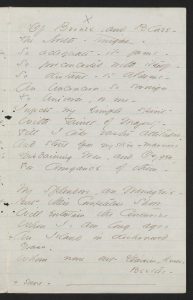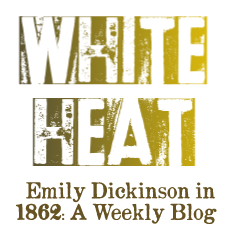 Of Bronze – and Blaze –
Of Bronze – and Blaze –
The North – tonight –
So adequate – it forms –
So preconcerted with itself –
So distant – to alarms –
An Unconcern so sovreign
To Universe, or me –
Infects my simple spirit
With Taints of Majesty –
Till I take vaster attitudes –
And strut opon my stem –
Disdaining Men, and Oxygen,
For Arrogance of them –
My Splendors, are Menagerie –
But their Competeless Show
Will entertain the Centuries
When I, am long ago,
An+ Island in dishonored
Grass –
Whom none but Daisies+, know –
+ Some + Beetles
Link to EDA manuscript. Originally in Poems: Packet XIV, Mixed Fasciles, ca. 1860-1862. Poems (1896), 133, with the alternatives not adopted. Courtesy of Houghton Library, Harvard University, Cambridge, Mass.
This poem takes its inspiration from a display of the Northern lights, or aurora borealis. In October 1851, Dickinson’s father Edward rang the church bells in Amherst to call attention to this rare display in the sky. Dickinson wrote about the phenomenon to her brother Austin (L53) and used the imagery of the lights in this poem and another from the same year, 1862, “Blazing in Gold – and /Quenching – in Purple” (F321, J 228). It was sewed into Fascicle 13, which takes up the theme of the relation of nature and the artist, and follows “There’s a certain slant of light” (F320A, J258). Susan Leiter points out the
three major elements/realizations in the poem: the grandeur of the northern lights (nature’s immortality), the poet’s myriad splendors (her poetry’s immortality), and the “Island in dishonored grass” (her personal, physical mortality). None of the three dominates. The subtlety and brilliance of the poem lies in the way Dickinson keeps these realities in motion around one another, letting each reflect upon and modify the impact of the others.
Of note is the end of the first long stanza, where the speaker’s “simple spirit” is “infected,” with “Taints of Majesty” from the glorious sight, “And strut opon my stem–.” The pride (strutting) is balanced by the ambivalence in “infected” and “taints.” The wonderfully compressed image expresses an entitlement that is clearly qualified. Its connection to the “Daisies” of the final line links this poem to the Master letters, which were discussed in Week 2:3.

